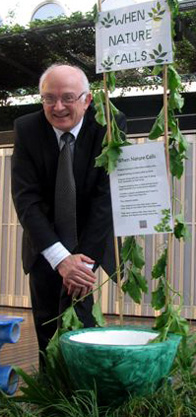Poor sanitation affects about 190 million people in the Asia-Pacific region. Approximately 75,000 children die every year from diarrhoea in South-East Asia and the Pacific alone.
Toilets are a very serious consideration in developing countries where hygiene can be the difference between life and death.
World Toilet Day is celebrated around the world every year on 19 November. This year the Parliamentary Secretary for International Development, Bob McMullan helped raise awareness of sanitation issues by launching the 100 Toilet Art Exhibition in Brisbane.
The exhibition was a timely reminder that more needs to be done to ensure dignity and health is made available to all in our region through good water and sanitation measures.
Of the 22 developing countries that Australia provides assistance to in our region, 10 are not on track to achieve the Millennium Development Goal for sanitation.
Without sanitation and clean water services, it's hard to make improvements in people's health, and if people are not healthy, it's harder for them to lead productive lives.
Decent sanitation is also a fundamental prerequisite of gender equality. Women suffer when sanitation is not safely available where they live and girls are less likely to go to school when sanitation is not of the appropriate standard.
In the 2008-2009 Budget, the Australian Government announced an investment of $300 million over the next three years to increase aid for water and sanitation. This will allow Australia to expand its work in the Asia-Pacific region. The new commitment will include greater assistance for urban water and sanitation projects to assist with the rapid urbanising process which is currently underway in many of our partner countries.
For more information:

